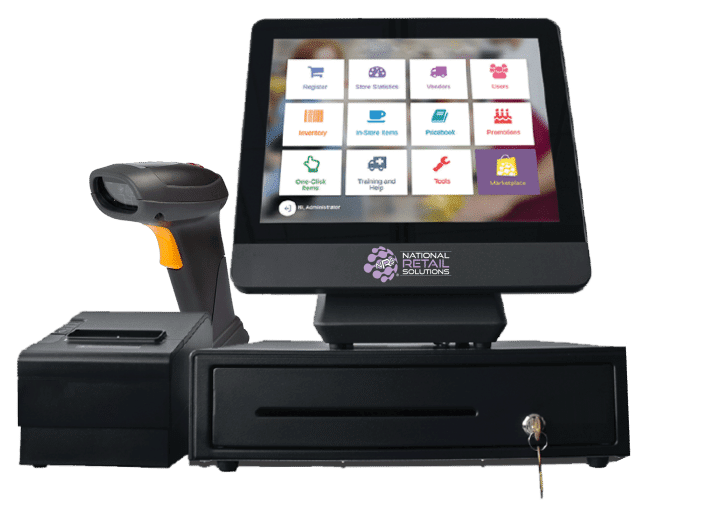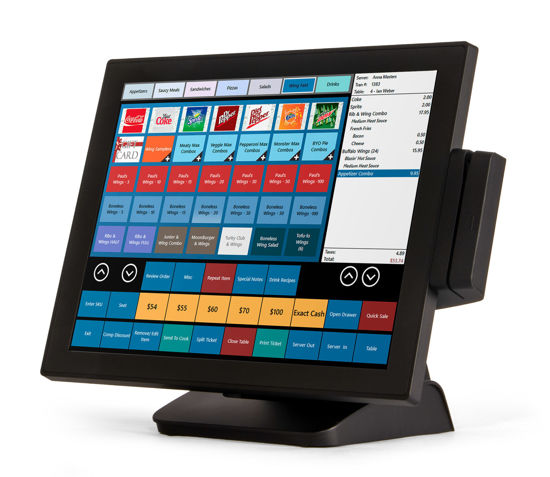The Ultimate Guide To Point Of Sale Software
4 Simple Techniques For Pos System For Small Business

Point of Sale: Retail Point-Of-Sale Solutions Streamline Transactions
Some Known Questions About Point Of Sale.

Hardware Elements of a Point of Sale System What makes a POS system tick? It's not just software application; the hardware plays a starring function. Consider it as the body to the software application's brain. Without the best hardware, even the most sophisticated POS software is simply a pretty face. Vital POS Hardware So, what are the must-haves? Let's break it down. The main processing unit, often a computer or tablet, is the heart of the operation. The screen or touchscreen show permits staff to engage with the system. A barcode scanner accelerate the checkout procedure. Keep in mind the days of manually going into each code? The reliable invoice printer provides clients with a record of their purchase. A money drawer keeps your cash safe and arranged. A card reader allows customers to pay with credit or debit cards. Diving Deeper: Beyond the Fundamentals However wait, there's more! Depending on your organization, you might need specific hardware. For instance, a restaurant may include cooking area printers to relay orders, while a retailer may utilize label printers for item tagging. Ever question how your read more local bakery quickly prints those delicious-looking labels? Selecting the Right Hardware: A Balancing Act Picking the right hardware isn't simply about purchasing the most expensive devices. It's about discovering the sweet spot between performance, sturdiness, and budget. A small organization just starting may choose a more fundamental setup, while a high-volume retailer will need robust, high-performance makers. Is it better to purchase brand-new or utilized? Consider your alternatives carefully. A new system offers the current technology and service warranty protection, but a refurbished system can save you money. The Future of POS Hardware What does the future hold? Anticipate to see a lot more integration with mobile phones, biometric scanners for worker authentication, and advanced analytics dashboards displayed on larger, clearer screens. Imagine a world where inventory is automatically upgraded in real-time as items are scanned-- a world where you can track your best-selling item from anywhere in the world. The possibilities are endless, and the hardware is continuously progressing to meet the demands of today's services. Are you all set to upgrade your point of sale system?
Software Features and Capabilities: The Heart of Your POS System
Ever watch an experienced barista slide through a busy early morning rush? Their trick isn't simply caffeine; it's a seamless dance with their POS system. The software application is the conductor of your service symphony, orchestrating everything from sales to inventory. What notes should you be listening for? What capabilities truly matter in today's market?
Stock Management: Beyond Counting Beans
Forget spreadsheets that haunt your dreams. Modern POS systems use real-time stock tracking, notifying you when your stock of artisanal coffee beans dips precariously low. Think of it as a digital guardian angel, avoiding those uncomfortable "Sorry, we're out!" minutes to customers. What if you could also forecast need based upon historic data? Lots of systems now provide forecasting tools, an effective weapon versus overstocking and lost sales. This assists prevent the dilemma of lacking popular items or building up excess stock of slow-moving items, both of which can constrain cash flow and space.
Sales Reporting and Analytics: Decoding the Information
Sales information is the brand-new gold, and your POS system is the miner. Forget feeling in one's bones just how much you offered today. Dive deep into the data to uncover trends, identify your best-selling items, and comprehend consumer behavior. Which menu item pairs perfectly with the day-to-day special? Which promotion resonated most with your clients? These insights are not simply fascinating; they're actionable intelligence. Without reputable sales reporting, browsing the intricacies of business decision-making becomes like cruising without a compass, increasing the possibility of bad moves and missed out on opportunities.
Customer Relationship Management (CRM): Structure Bridges, Not Walls
Keeping in mind a regular customer's name and favorite order is lovely, however scaling that personal touch is difficult. POS systems with CRM capabilities permit you to track customer purchase history, preferences, and even birthdays. Imagine automatically offering a discount rate on their birthday-- a small gesture that promotes commitment and motivates repeat organization. There is the possible snag of poor data quality, which can lead to inaccurate customer profiles and ineffective marketing efforts.
Payment Processing: Improving the Deal
The checkout experience can make or break a sale. Smooth integration with different payment approaches-- credit cards, mobile wallets, even copyright-- is non-negotiable. Can your system manage split payments? Does it provide safe and secure tokenization to protect client information? A clunky payment procedure is like hitting a sour note in your organization symphony, potentially interfering with the whole performance. Making sure compatibility with evolving payment innovations and adherence to security standards are vital for preserving consumer trust and operational performance.
Worker Management: Keeping the Group in Sync
From clocking in and out to managing permissions and tracking performance, staff member management includes improve operations and enhance responsibility. Is scheduling a headache? Lots of POS systems use incorporated scheduling tools, optimizing staffing levels based on forecasted demand. A typical barrier that is often ignored is the difficulty of incorporating staff member management performances with payroll systems, which can result in errors and inefficiencies in wage computations.
Advanced Characteristics: Leveling Up Your Operations
- Table Management: Ideal for dining establishments, this feature allows you to picture your dining room, track table status, and handle bookings.
- Commitment Programs: Reward your best clients and motivate repeat business with integrated commitment programs.
- Online Purchasing Integration: Effortlessly integrate your POS system with online purchasing platforms to broaden your reach.
Selecting the best POS system has to do with more than simply functionality; it has to do with discovering a partner that can grow with your service. Consider your existing requirements, prepare for future development, and don't hesitate to ask the hard concerns. The ideal software application can change your company from a disorderly cacophony into a harmonious masterpiece.
Industry-Specific POS System Applications
Consider the local pastry shop, dynamic with early morning clients craving fresh croissants. A generic POS system might deal with deals, but can it manage complicated dishes, track component inventory, or instantly change production schedules based on sales information? Probably not. That is where the charm of industry-specific POS systems shines.
Restaurants and Hospitality
For dynamic restaurants, speed and precision are vital. The number of times have you seen servers handling orders, adjustments, and splitting bills, all while trying to provide exceptional service? A restaurant POS system enhances these processes, permitting table management, kitchen order tickets, and even online purchasing integration. These systems typically include features like ingredient-level stock tracking, essential for handling food costs and decreasing waste. Ever question why your favorite dish is in some cases unavailable? It may come from an absence of correct inventory management.
- Table Management
- Cooking Area Order Tickets
- Online Ordering Integration
- Ingredient-Level Inventory Tracking
Retail Solutions
Retail, with its diverse inventory and consumer interactions, requires a various set of tools. Think of a shop clothing store struggling to keep track of sizes, colors, and seasonal collections using a fundamental checkout system. An industry-specific retail POS system uses functions like barcode scanning, customer loyalty programs, and comprehensive sales reporting. These systems can even incorporate with e-commerce platforms, supplying a seamless omnichannel experience for clients. Did you understand some retail POS systems can anticipate future sales patterns based on historic data? Now that is powerful!
The Hazards of an Inequality
Selecting the wrong POS system can develop significant functional hurdles. A clothing store using a dining establishment POS, for instance, would find it unsuitable for handling stock with sizes and colors. The absence of proper reporting and analytics might lead to mistaken buying decisions and lost revenue. The outcome might be similar to trying to fit a square peg in a round hole.
Key Factors to consider
Picking an industry-specific POS system requires mindful assessment. Believe about your organization's distinct needs and functional workflows. Does the system incorporate with existing software application? Does it offer the necessary reporting capabilities? Is it scalable to accommodate future growth? A well-chosen POS system is not simply a transaction tool; it's a strategic asset that can drive effectiveness, improve customer complete satisfaction, and ultimately, increase your bottom line. Keep in mind, it is an investment in your business's future, not simply a cost.
Security Factors To Consider for Point of Sale Systems
Ever heard the tale of the mom-and-pop store that lost everything because of a single, overlooked security flaw in their POS system!.?. !? It's a cautionary tale, and it highlights an important aspect typically eclipsed by the allure of elegant features and structured operations. The truth is, a POS system is only as excellent as its security. What great is a system that crunches numbers in a flash if it allows bad guys to swipe client's information simply as quickly?
The Vulnerability Minefield
The digital landscape is a battleground. Every POS system, no matter size or sophistication, is a potential target. Are you genuinely got ready for the threats prowling around the corner? The genuine pinch comes when you find that your outdated software has a gaping hole that hackers can make use of, turning your business into an unwitting accomplice in identity theft. The difficulty is that hackers are crafty and are always changing their strategies.
Typical Security Gaps and Specialist Tips
- Weak Passwords: "Password123" isn't sufficing. Usage strong, unique passwords for all POS system accounts and change them routinely. Two-factor authentication is a must.
- Unsecured Networks: Your Wi-Fi is like leaving the front door open. Protect your network with strong file encryption (WPA3 if possible) and think about a separate network for your POS system.
- Outdated Software: Software application vendors patch security holes all the time. Failing to upgrade is like inviting difficulty. Establish automatic updates or schedule regular upkeep.
- Staff member Training: Your personnel is your very first line of defense. Train them to recognize phishing attempts, secure passwords, and report suspicious activity.
Data Encryption: Your Guard Versus the Dark Arts
Consider information encryption as a secret code. It scrambles delicate details, like charge card numbers, making it unreadable to unauthorized users. Without file encryption, your customers' financial details are like sitting ducks, ripe for the picking by cybercriminals. It's not simply about securing your clients; it's about safeguarding your reputation and preventing hefty fines.
PCI Compliance: The Rulebook You Can't Overlook
If you accept credit cards, you're bound by the Payment Card Industry Data Security Standard (PCI DSS) It's a set of security standards designed to secure cardholder data. Failing to comply can result in fines, penalties, and even the loss of your ability to process charge card payments. It's a headache, yes, however it's a needed one. Believe of PCI compliance as the expense of doing service in the digital age.
Consider this: every transaction processed through your point of sale is a prospective entry point for destructive stars. By executing robust security steps, you're not just protecting your service; you're safeguarding your customers' trust and guaranteeing the long-term practicality of your operations. The security of your POS system isn't just a technical issue; it's a company important. It requires constant caution, proactive measures, and a dedication to remaining ahead of the curve.